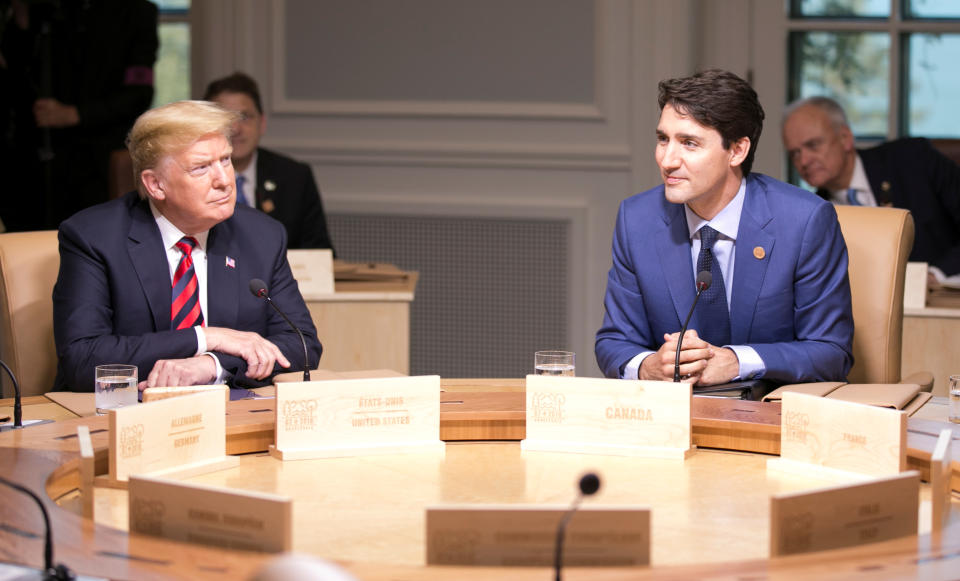Canada has leverage over the U.S. on tariffs, but should it be used?

USMCA is close to being a done deal. The trade agreement between the U.S., Mexico, and Canada just needs to be ratified.
But the U.S. still hasn’t removed tariffs on steel and aluminum. Canada has some leverage in getting them removed before signing, but that doesn’t necessarily mean pressure tactics are the right move.
To muddy the waters even more, the U.S. Department of Commerce launched an investigation into steel dumping allegations from Canada, China, and Mexico as recently as February 27. It was initiated based on a request from the American Institute of Steel Construction (AISC), which says Canada sells steel in the U.S. at a discount of as much as 30 per cent and receives unfair government subsidies.
There’s more than one way to skin this cat. The Ontario government called on Ottawa to drop retaliatory tariffs Canada imposed in response. Canadian officials have threatened not to ratify USMCA until the tariffs are removed.
Jean Simard, president of the Aluminium Association of Canada, says Ottawa should stick to its guns on both issues.
“The two put together contribute to keeping the right level of tension in addition to the self-imposed impacts of the U.S. tariffs on the U.S. domestic industry,” Simard told Yahoo Finance Canada.
“Canada is aligned with leaders in Trump’s own party in Congress (Senator Grassley), the business community that Trump has asked to help lead USMCA advocacy in Congress (U.S. Chamber of Commerce) and labour (Steelworkers). Canada has leverage, but the bigger point is that there is a massive coalition in the U.S. that will demand it.”
Catherine Cobden, president of the Canadian Steel Producers Association, agrees.
“As for USMCA, it is difficult to ratify a new free trade agreement with these steel and aluminum tariffs in place between our two countries,” Cobden told Yahoo Finance Canada.
“Nine months into this situation, the tariffs are having a negative impact on both sides of the border and support is growing in the U.S. as well for their removal.”
Trade lawyer at MAAW Law Mark Warner says not ratifying USMCA isn’t a credible threat.
“Canada has made similar threats before and had to back down and Americans know Trudeau has a majority government and can make his trained seals dance when he wants, so I doubt the U.S. expects Parliament to pass USMCA before Congress acts even though the Trump Administration would probably find that to be helpful,” Warner told Yahoo Finance Canada.
Warner says Canadian demands won’t do any great harm but have the potential to backfire.
“Unless it emboldens Democrats in Congress to block USMCA and encourages Trump to up the ante by notifying a withdrawal from the existing NAFTA to gain leverage over Congress,” said Warner.
Fellow Trade lawyer Dan Ujczo, from Dickinson Wright, says reminding the U.S. that ratification in Canada is not guaranteed is one of its only pieces of leverage, but says an offer of assistance is a more effective message.
“Canada can advance quickly with passing the USMCA, which the White House can then use to persuade reluctant members of Congress that this is a good deal, even the Canadians are on board!” Ujczo told Yahoo Finance Canada.
Canada could get on friendlier terms with the Trump administration by lobbying Congress to get on board.
“The White House has asked both Canada and Mexico for this support to help persuade House Democrats to (1) introduce the USMCA implementing legislation, starting a clock on a vote; and (2) pass the legislation,” Christopher Sands, a professor at Johns Hopkins University, told Yahoo Finance Canada.
“Thus far, Canada and Mexico have said they cannot undertake a lobbying effort with Congress while Section 232 tariffs are applied on steel and aluminum and possibly pending on autos.”
Like Warner, Sands doesn’t think not ratifying USMCA is a credible threat.
“Whether Canada approves the legislation in Parliament or not makes no difference to the United States. Most here see Canada suffering from uncertainty over Canadian market access, and so doubt Canada would seriously delay approval,” said Sands.
“Two things are more likely: (1) that Canada presses ahead of ratification because the U.S. is making changes to its commitments under the USMCA and so if Canada passes the deal as negotiated they may hope to ‘lock in’ concessions they can petition for in court later; (2) that Canada passes the legislation so that the USMCA is not pending during the next Canadian federal elections.”
Download the Yahoo Finance app, available for Apple and Android.

 Yahoo Finance
Yahoo Finance 